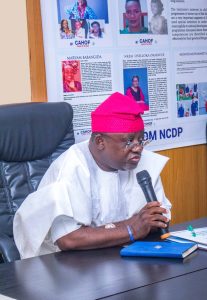HOW TOURISM CAN SAVE THE NAIRA

As Nigerian currency continues to depreciate tourism is one of the modern ways of generating income in the world over but Wale Abideen discovers that Nigeria’s government lost huge potentials of tourism income to South Africa, United Arab Emirates,UAE and a few other countries with success stories in tourism industry.
 “Nigeria remains one of the countries yet to begin harnessing its historical and anthropological assets to position them for marketable attraction, economic gains and job creations. There is a huge potential here but the government concentrate on oil and that is why the Naira suffers among world currencies” This was the position of Jimoh Olayemi Maleek, Principal Tourist Officer at the Nigerian Tourism Development Corporation, NTDC, a body charged with the responsibility promote Nigeria’s tourism potentials. Maleek further opines that Nigeria has the capacity to create over ten thousand jobs for its teaming unemployed youths through tourism thereby charging the government at all levels to diversify the nation economy from oil to other sectors such as tourism in other to boost the country’s revenue base.
“Nigeria remains one of the countries yet to begin harnessing its historical and anthropological assets to position them for marketable attraction, economic gains and job creations. There is a huge potential here but the government concentrate on oil and that is why the Naira suffers among world currencies” This was the position of Jimoh Olayemi Maleek, Principal Tourist Officer at the Nigerian Tourism Development Corporation, NTDC, a body charged with the responsibility promote Nigeria’s tourism potentials. Maleek further opines that Nigeria has the capacity to create over ten thousand jobs for its teaming unemployed youths through tourism thereby charging the government at all levels to diversify the nation economy from oil to other sectors such as tourism in other to boost the country’s revenue base.
SECURITY MONITOR checks reveal that United Arab Emirate, UAE, created Dubai and Abu Dhabi as business cities to harness tourism resources and generate income. It has been unraveled that Nigeria lost over $70 million annually to South Africa, a former apartheid nation which has successfully used tourism to reinvigorate its economic potentials. Year in year out, Nigeria wealthy individuals and notable politicians ‘lavish’ monies in Dubai and South Africa for one engagement or the other, Late last year, it was said that former vice president Abuakar Atiku’s son held a flamboyant wedding ceremony in UAE. Findings reveal that UAE recorded a GDP of $110 billion through tourism in 2013 while the sector contributed about 9.55 percent to South Africa GDP the same year.
An official in the Ministry of Tourism hints SECURITY MONITOR that “Nigeria does not have accurate record of tourism contribution to GDP”, According to former Minister of Tourism, Eden Duke, despite the over 500 tourist centers in Nigeria, the sector appears not to be generating anything close to the tourism earnings in South Africa who has less tourist attraction sites but has invested in it to garner more income. It was recently discovered that unlike Nigeria with natural tourists cites, Dubai which earns hugely in the sector only created artificial sites for tourism development.
 It means therefore the country stands a good chance to improve its revenue generation if the government shows greater commitment to the development tourism sector. NTDC boss, Sally Mbanefo shed more light on the potential of tourism in Nigeria as she urges more investment in the sector, Mbanefo added that “If we assume that a low estimate of 20 million out of 160 million Nigerians travel locally for business, leisure, culture, religion or sports annually and they spend only 10 per cent of Nigeria’s per Capita income of $2000 annually, we will have a $4 billion domestic tourism market.”
It means therefore the country stands a good chance to improve its revenue generation if the government shows greater commitment to the development tourism sector. NTDC boss, Sally Mbanefo shed more light on the potential of tourism in Nigeria as she urges more investment in the sector, Mbanefo added that “If we assume that a low estimate of 20 million out of 160 million Nigerians travel locally for business, leisure, culture, religion or sports annually and they spend only 10 per cent of Nigeria’s per Capita income of $2000 annually, we will have a $4 billion domestic tourism market.”
The NTDC boss in a stakeholder conference explained that the $4 billion is still a far cry from the annual oil proceeds, which was $42 billion in 2012, but if this is added to the revenue accruable from international tourism, the figure amounts to huge fortunes. And considering the bourgeoning population of Nigeria, it is expected that Nigeria should at least be performing much better than South Africa, Uganda, Tanzania, Kenya, Morocco and Egypt. These are the other African countries reaping the dividends of vibrant tourism industry. And incidentally, Nigeria which supposed to be giant in this sector because of its natural endowment is lagging behind.
This calculation may have ignited a new campaign by the Ministry of Tourism, NTDC and other relevant stakeholders to articulate a strategic frame work and policy formulation aim at positioning Nigeria at the advantage of maximizing the benefits of its tourism potentials.
However, it is worth of note that government at all levels doesn’t always pay a desired attention to the tourism sector. A good example will suffice when we s close look at the budget allocation to the sector. In 2012, Federal Government budgeted a little above N20 billion which was to be shared among 13 MDAs in the tourism sector. NTDC that is charged with the responsibility of marketing Nigeria tourism got a paltry sum of N1, 344,787, 346. Out of this, N1, 134, 077, 646 goes into salaries and overheads while 210, 709, 700 was earmarked for capital expenditure. This practically made impossible for the corporation to go deliver its mandate.
A visit to most tourist sites across the states bears evidence of the Nigerian government unpreparedness to play in the big leagues of tourism earners. Yankari game reserve, a premier game reserve was reported to have poor accommodation facilities that may not even attract considerable number of domestic tourists, regardless of international tourists on long vacation. Other parks such as Kainji Lake National Park, Old Oyo National Park, Gashaka Gumti, Okomu, Chad basin, Kamuku do not fare better perhaps with the exception of Obudu ranch. The story is not different with most Nigerian beaches. Recently, this various publications have exposed the crisis on Lekki and Atlas Cove beaches in Lagos. These are goldmines waiting to be tapped but still remain in the virgin state as a result of negligence.
There are many festivals and carnivals organized across the 36 states of the federation. Many of these cultural events are potential income gainers on their own – both for the government and the community. The Eyo in Lagos in Lagos has a potentials of generating over 100 million naira as tourists from far and near storm the Tafawa Balewa square for the event, And if well packaged, the Osun festival in Osogbo can generate income capable of transforming the country into a Mecca of sorts, Ogun festival in Oyo, Ojude Oba festival in Ijebu Ode, Ofala festival in Anambra, yam festival in Abuja,suleja and the entire eastern states are few numerous areas of untapped ventures in the country. Promotion of these festivals is mostly left in the hands of a band of charlatans pretending to be festival consultant while governments rather act the role of cheerful givers.
Another key area of challenge in Nigeria tourism industry is transportation. It cannot be over emphasized that good transportation system is key to tourism growth. But the crises in Nigeria aviation industry, dilapidated state of Nigerian roads, and disorganized system of transport business have further narrowed the chances of tourism development in the country. The news of regular air mishap drives many potential tourists far away from the country. While South Africa attracted about 9.2 million tourists in 2012, Nigeria has no such data. But according to a 2010 World Bank report, the number of arrivals in Nigeria was 1414000 in 2009.
The situation is further compounded by the foreign tourist perception of widespread insecurity in Nigeria. There are reports of hotels providing shelter for criminal gangs, tourist sites patronized by drug users, muggers, kidnapers and prostitutes. In 2009, NTDC reportedly discovered that 70 percent of stolen cars are kept in hotels, though many unregistered hotels have been closed down on account of this discovery. Nonetheless, the incident of insecurity around hospitality establishments still makes wrong signals to potential tourists.
Tourism industry also requires a regime of dynamic law, which at present is yet to evolve. Safe for Lagos state government that has been reviewing their tourism law, other states of the federation are yet to use the instrumentality of law to grow the tourism industry. To play an effective role in the development and promotion of tourism, government must formulate appropriate policies and laws to control, standardize and sanitize operations in the industry.
In addition, the inter-sectoral cooperation that should exist within and outside tourism industry is being lacking. Therefore, when the former tourism minister said there was no record of tourist visits, he was indirectly harping on the disconnect among the various agencies of government including private sectors. Madam Mbanefo though has promised integration of services by all relevant stakeholders namely, immigration, aviation, security, health, hospitality, transportation, banking, media, legislature and others. But this would only occur if the higher authorities in government are positively disposed to this innovation.
Director of Financial and Private Sector Development for the World Bank in Africa, Gaiv Tata got it right when he said, healthy tourism growth, wealth creation and shared prosperity requires joint public and private sector efforts.
Given the Nigeria abundant natural and cultural resources, the country has a great chance to rake in good fortunes from tourism. More fundamentally, governments at all levels need to quit sloganeering on the super gains of tourism and get to the work of attracting massive investment into the tourism industry. This is however a task that will be geared towards real investment in other to save the country from revenue crisis peradventure there is doom day for the oil business.








